
* This post is written by one of our volunteer content creators - it is not sponsored. *
Daily living aids are usually small pieces of equipment used within the home to help people with disabilities live more independently. However, not every item lives up to their sales expectations. So, the AYL team have teamed up to create a series of blog posts highlighting our favourite disability related products, starting with kitchen aids and now bathroom assistance! As you will see, many of the items listed below are constructed using simple designs, yet they all have the power to make life a little easier, whether you are having a shower or using the toilet.
(Priced At £13.99 To £23.99 Depending On Place Of Purchase)
This product has been a huge help, especially whilst living in a property that isn't entirely accessible, as my carer can wash my hair whilst I lie down in bed. It's especially helpful on days when I simply do not have the spoons to use a regular bath or shower, even with assistance. I also feel it could be useful to keep in my hospital bag, as it is much easier than a regular "bed bath" and can be packed away into a small bag.
How It Works:
There are two inflatable chambers, both of which comfortably cradle your neck and prevent any water from splashing out. It takes a little while to figure out the technique that works for you, but it soon became quicker and easier to use. We also leave mine permanently inflated, so we only have to grab a towel, shampoo, and a couple of jugs of warm water to wash my hair! Once finished, the drain outlet allows for easy emptying and cleaning.
Ideal User:
Anyone with reduced mobility! Particularly when travelling, camping, or if you aren’t too sure about the accessibility of your accommodation. It’s also much easier for carers, as helping someone shower often results in getting wet, and a bath requires continuous bending.
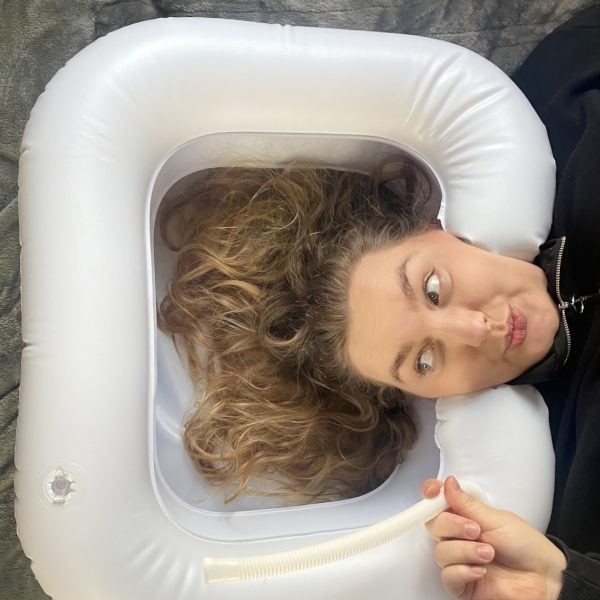
(Priced At £22.42 To £69.99 Depending On Place Of Purchase)
(Usually Loaned Following An Occupational Therapy Assessment Or Contact With Social Care Services)
Now there are many different types of shower stools and chairs on the market, and it is not a ‘one size fits all’ when it comes to finding the best product for your physical needs, bathroom arrangement, and personal preference. Thankfully I was kindly given 3 different options to try at home (one stool, one perching chair, and one chair with armrests) following an occupational therapy assessment. They can also be purchased through main retailers and mobility suppliers in a variety of similar designs.
How It Works:
These options all had height-adjustable frames made from tough, plastic-coated steel, rubber ferrules on the feet to increase stability, and plastic seats that drain water effectively. I much preferred using the standard shower chair as it not only makes it easier to lower yourself down/stand back up; but also provides extra support in the form of a backrest whilst showering (a must for anyone living with POTs).
Ideal User:
Anyone who is at risk of slipping and falling in a shower. Along with people who fatigue easily or struggle to bend down when standing.
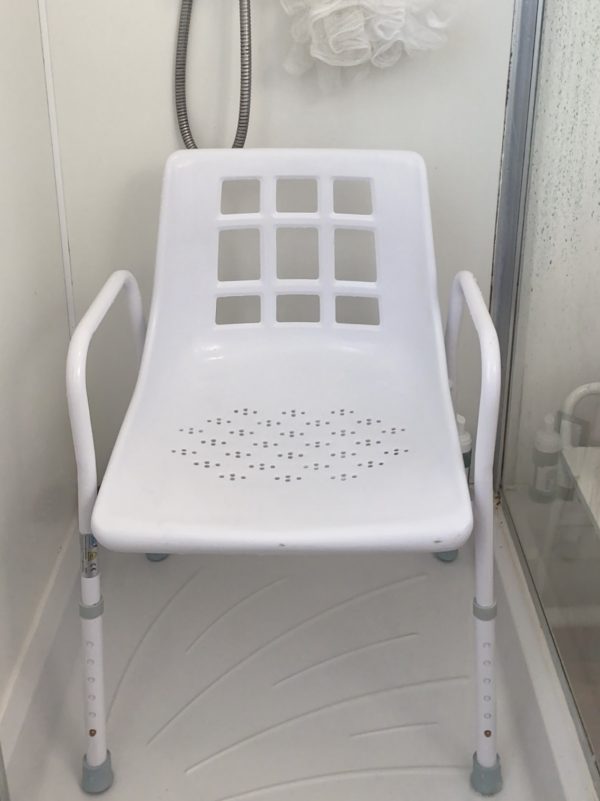
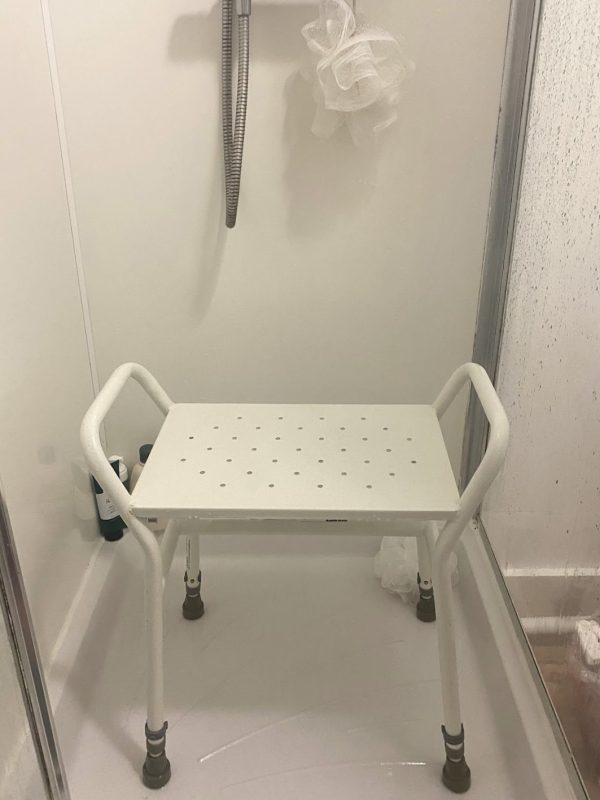
(Priced At £6.50 To £8.60 Depending On Place Of Purchase)
Safety in the shower is particularly important for people prone to falling, yet bathmats are likely to go mouldy and lose grip. So, I love these tenura non-slip circles as they not only take the ‘edge’ off the slip in the bath, but they are also anti-bacterial. Each roll contains 72 discs 40mm in diameter and you can use the provided template to avoid creating wonky patterns.
How It Works:
When applying these waterproof stickers make sure the shower/bath base is clean and dry. Then simply peel the sticker away from the roll and apply it to the surface. Then you will have a slip-free surface, which is also unobtrusive, anti-bacterial, and easy to clean.
Ideal User:
Anyone at risk of falling/slipping in the bathtub or shower. They could also be used in wetrooms, swimming pools, paddling pools, or even hot tubs. Finally, anyone that cannot use regular bathmats due to a mould allergy.
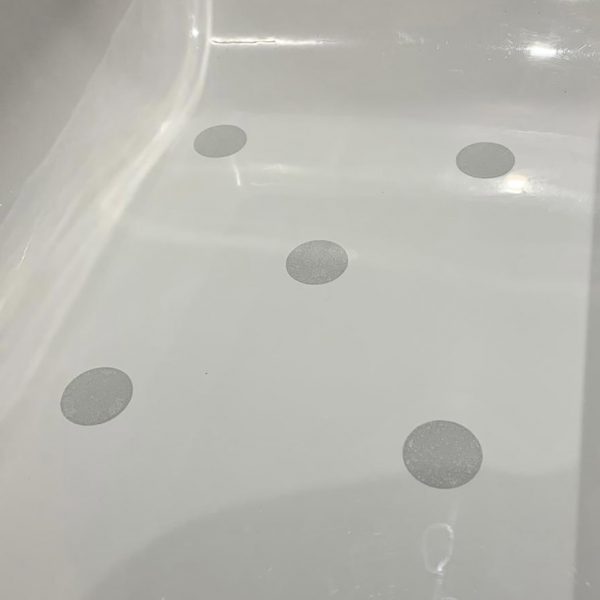
(Priced At £100+ Depending On Place Of Purchase)
(Usually Supplied Following An Occupational Therapy Assessment Or Contact With Social Care Services)
When I first had an OT assessment, they wanted to give me a toilet seat riser, which is a donut shaped plastic ring that sits on top of a regular toilet seat to make getting on and off easier. It was a step further than I was able to accept at the time, so initially declined the offer. Fast forward 18 months and my bathroom was converted into a wetroom via a Disabled Facilities Grant from my local council. Enabling me to switch to a comfort height toilet and avoid any obvious extra aids.
How It Works:
It is 2-4” higher than that of a standard toilet, making it easier to stand up, creating a more comfortable sitting position, and putting less pressure on joints. Best of all, it is still a ‘normal’ toilet, so you don’t notice any difference until you sit down; this is when some of my smaller guests find their legs swinging as they don't quite reach the floor!
Ideal User:
Anyone who has difficulty sitting and then standing up from a regular toilet, whether it’s because of their height or mobility related issues.
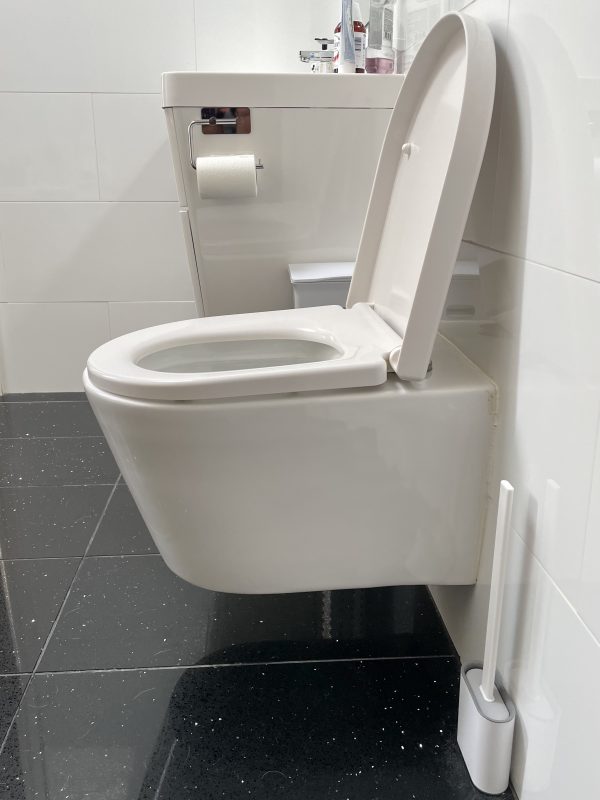
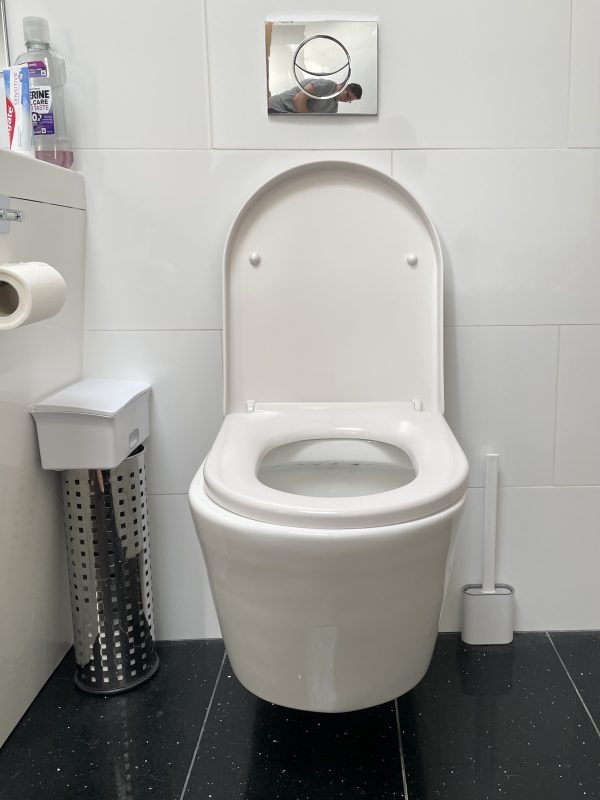
(Priced At £23.32 To £60.00 Depending On Place Of Purchase)
(Usually Loaned Following An Occupational Therapy Assessment Or Contact With Social Care Services)
At first, the sight of my OT bringing a white and grey toilet frame into my home made me want to tell them to take it away again, as I couldn’t imagine ever getting used to it being in my home. It also looked like it belonged to an elderly person or a hospital setting. But over time, I’ve come to recognise just how invaluable this simple piece of equipment is, and how much it starts to blend into the bathroom after a while.
How It Works:
The freestanding frame is height adjustable, easy to use and compatible with most standard toilets. Provides excellent support when standing and sitting, has non-slip ferrules that prevent it from moving around, and plastic armrests for added stability. Resting my elbows when sitting has not only saved me from falling off the toilet on many occasions, but it also means that I have two stable arms to push up from on days when my legs struggle to stand up from the toilet.
Ideal User:
Whilst I may have initially cringed and hated the grey and white monstrosity that arrived in my bathroom, it’s proved to be something I now wouldn’t be without. It would benefit anyone who otherwise depends on someone else for stability, those prone to falling, or having difficulty balancing.
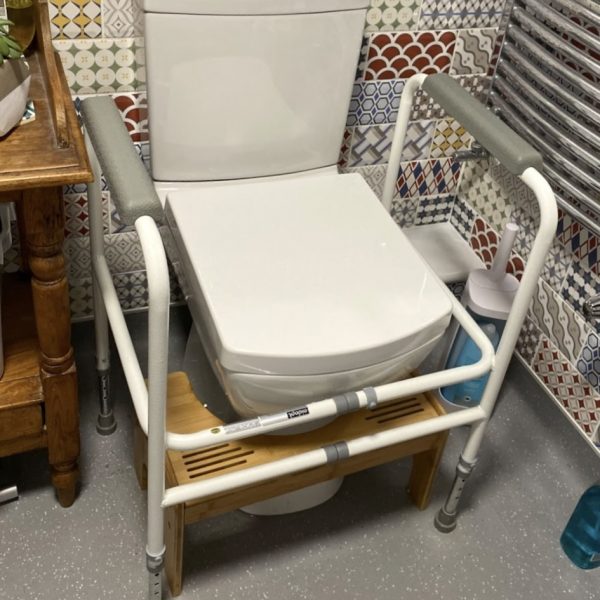
As you can see, each item was designed to make life easier and they all did just that! Although I’m sure you can agree that together these items only cover a small portion of the bathroom let alone your home, so don't forget to check out part two followed by our other daily living aid review series COMING SOON.

Hi, I'm Lauren and I have been living with a collection of disabilities for the past 8 years. I initially had a passion for teaching children with special needs, but my health prevented me from pursuring my dream career. Despite this, I now love nothing more than sharing my experiences to help other people living with disabilities.
Hi, I’m Lori and was diagnosed with Ehlers Danlos Syndrome and a family of co-morbid conditions which has made life highly complex. However I constantly aim to make life as ‘normal’ and fulfilling as possible - and through this, I discovered the benefits of writing about my journey.
 GET IN TOUCH
GET IN TOUCH


